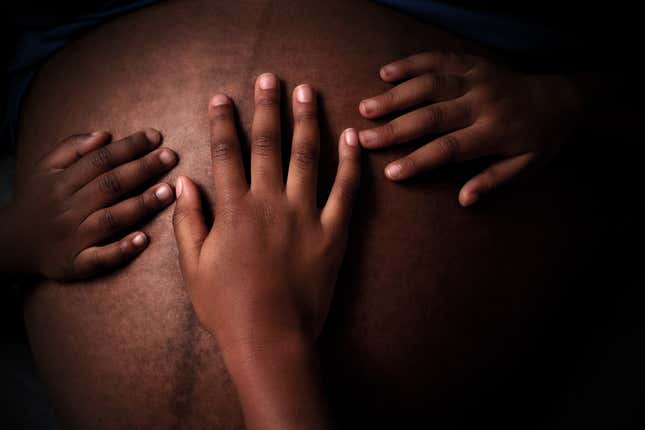
A wave of research and media coverage over the last several years has ensured that the public knows more about America’s Black maternal health crisis than ever before. But as a new study reveals, the systemic factors that propel such disparities in maternal and infant health may be getting worse.
The new study, published last Thursday in JAMA Network Open, part of the Journal of the American Medical Association, found that climate change is adversely affecting birthing parents and their children—with Black women being the group suffering the most severe impacts.
Overall, researchers found pregnant women exposed to high temperatures or air pollution were more likely to birth premature children, reports the New York Times. Infants were also more likely to be underweight or stillborn. But Black birthing parents and their children were more likely to experience these harms than the population at large.
The sweeping study looked at 32 million births in the U.S., compiling and analyzing dozens of studies published since 2007 that focused on birth outcomes and environmental factors.
Recent figures from the Centers for Disease Control found Black birthing parents are three to four times more likely to die from pregnancy-related complications than white women. CDC research also shows that Black women give birth prematurely at 50 percent higher rates than white parents.
According to the authors of the study, the disparities are driven by systemic problems, including worsening air pollution and climate change.
Dr. Rupa Basu, who leads the air and climate epidemiological section for the Office of Environmental Health Hazard Assessment in California and co-authored the paper, pointed to the fact that African Americans are more likely to live close to power plants and closer to freeways. The exposure to fumes from diesel exhaust and factories has been linked to a number of conditions, ranging from asthma to lung cancer and heart disease. Basu also noted to Vogue that Black and Latinx neighborhoods are more likely to be “heat islands”—hotter than surrounding communities due to “more blacktops, less green space.”
Black households also typically have fewer resources to push back against these environmental factors. They may continue to find obstacles to living in neighborhoods with more green spaces, and low-income households may not be able to afford air conditioning to help cool down their homes. Then, there’s the issue of what happens when a serious condition arises—Black people are more likely to live in “medical deserts”—places where primary care physicians are difficult to find. Once they find a physician, Black patients are also less likely to get adequate treatment than their white counterparts once they do seek help—a story that frequently comes up with regard to black maternal care in particular.
“We already know that these pregnancy outcomes are worse for black women,” Basu told the Times. “It’s even more exacerbated by these exposures.”
Environmental justice advocates say the paper highlights the need for tighter federal regulations against air pollution.
“This is a moment of reckoning for racial injustice and health disparities,” Catherine Garcia Flowers, a field organizer in Houston for the advocacy group Moms Clean Air Force, told the Times. “Doing nothing about air pollution, which so clearly has a greater impact on Black Americans, is racism in action.”
The cost for government inaction will fall squarely on Black families, namely, on the infants who will live with the long-term consequences of their community’s exposure to worsening pollution. Premature birth and low birth weight has serious longterm consequences, impacting brain development and making children more vulnerable to future diseases, says Dr. Nathaniel DeNicola, one of the paper’s co-authors and an assistant professor of obstetrics and gynecology at George Washington University’s School of Medicine and Health Sciences.
As he told the Times, “This really does set the stage for an entire generation.”



